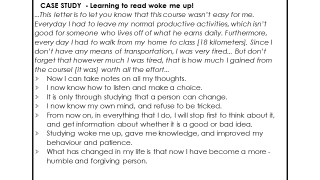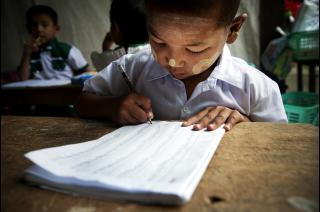What is literacy? How words work
For many it is the first skill taught at school; learning how to read and write. Literacy is a fundamental human right for all – children, youth and adults. Decoding letters, groups of letters, words and how they sound is crucial to every day life. While literacy rates have grown steadily over the last decade, not everyone has a chance to learn to read and write and universal literacy is still far from a reality.
- Nearly a billion people entered the 21st century unable to read a book or sign their names.[1] One in five adults is still not literate
- In the UK the literacy rate is 99%, which means one in every hundred struggle to read and write.
Invisible; illiteracy is a problem that is not outwardly apparent and while many find ways around it to get through life, they also miss out on a whole host of opportunities. Adults are less likely to go back to school to learn how to read and write, which makes it especially important, and why the UN focuses on, children receiving a primary school education.
72 million children are out of school.[2]
Why is literacy important? Literacy takes you places.
Literacy is a human right and key to discovering other human rights. Literacy is a life skill, the building block for further/lifelong learning. Strong literacy skills are closely linked to the probability of having a good job, decent earnings, and access to training opportunities. The reverse is also true.
- In the UK 95 per cent of all employment in the UK requires employees to be able to read. Just under two-thirds of men and three-quarters of women with very low literacy skills have never received a promotion.[3]
Literacy is also an investment in future generations as literate parents are more likely to send their children to school; literate people are better able to access continuing educational opportunities; and literate societies are better placed for success.
- In India high literacy districts have a greater proportion of children who survive infancy.[4]
Being able to read and write takes people places, but also helps local communities and countries to move away from unhelpful stereotypes. Evidence shows that investment in literacy for women yields high development dividends. “Every literate woman marks a victory over poverty”.[5]
What are the challenges to literacy?
Literacy is a life skill. Living without literacy can create barriers and splits between people. It can create a poverty split, gender split and country split to name but a few and getting over these barriers created by illiteracy is a challenge in itself to promoting literacy.
- Almost a quarter of countries in the world have adult literacy rates below the developing country average of 79 per cent, mostly in sub-Saharan Africa, and South and West Asia. Nineteen of these countries have literacy rates of less than 55 per cent.
- Two-thirds of the one in five adults unable to read are women.[6]
Books, teachers and other materials are needed to teach literacy, and many places do not have access to these resources literacy levels are low. Those who want to learn to read and write also need to give time to do so; this is time away from the land and their livelihoods, a compromise which some people are unable to make as they are barely able to make ends meet.
What does the UN do?
Since its foundation in 1946, UNESCO has been at the forefront of global literacy efforts and is dedicated to keeping literacy high on national, regional and international government agendas. UNESCO also runs literacy programmes aim to create a literate world and promote literacy for all.
Literacy is integral to the success of a wider UN campaign running from 2000-2015 called the Millennium Development Goals (MDGs) which aims to alleviate poverty.
- Goals 3 (Ensuring that the learning needs of all young people and adults are met through equitable access to appropriate learning and life-skills programmes)
- Goal 4 (Achieving a 50 per cent improvement in levels of adult literacy by 2015, especially for women, and equitable access to basic and continuing education for all adults).


